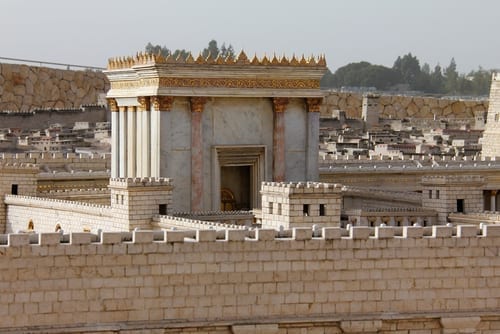
A cohen is a Jew descended from Aaron the Cohen, who was the first Jewish High Priest who passed down the priesthood to his descendants as their inheritance.
1. Today, contemporary cohanim are those Jews who have a tradition in their family that they are from a family of cohanim, even though today no one has a book of lineage that can prove his direct line back to Aaron the priest.
2. The cohanim had special roles in addition to the work of offering sacrifices in the Temple. Some of those functions, including reciting the priestly blessing, and receiving the redemption money when a Jew redeems his first-born son, are still performed after the Destruction of the Temple and the abolition of the sacrifices.
3. Two prohibitions are also applicable to cohanim after the destruction of the Temple:
The prohibition of marrying a divorced woman, a childless widow who didn’t marry her husband’s brother (chalutza), a woman who was the product of a cohen married to a woman forbidden to him, or a convert. He may only marry a single woman or a widow. A High Priest (a position which only existed during the time of the Temple) was only allowed to marry a single woman.
Another prohibition is they may not defile themselves by having any contact with a dead person, and may not be in one “tent” [building] with someone who died. Until this day, cohanim may not get close to a cemetery and have to avoid entering a hospital when there are dead people in it. However, cohanim have a commandment to defile themselves when the dead is one of their seven relatives: father, mother, son, daughter, brother, sister and wife.
4. The Jewish people are commanded to sanctify the priest, and give him gifts for his priestly service. Therefore, the priest must be honored when it concerns any holy matter: He is the first one to lead the Grace After Meals, to get the first reading of the Torah in the synagogue, and the first to choose a nice portion at the table. The significance of this commandment is explained in the Talmud: “The students asked Rabbi Preida why he merited longevity? He told them… I never recited a blessing before a cohen.”
5. The cohanim, like the rest of the tribe of Levi, did not receive an inheritance in the land of Israel, so they would be available to teach Torah to the people and do the service in the Temple. In place of an inheritance, and as compensation for their service, the Torah gives cohanim twenty-four gifts, which include parts of the sacrifices brought to the Temple, and a portion of the agricultural produce which is called teruma, and other gifts.
6. The root of the word cohen comes from ken, which means “prepare”, because their role is to prepare the sacrifices. Also, the word cohen in ancient Egyptian language expresses high position and affluence. Some interpret the word to mean an “officer” and “rich”.
7. During the days of King David, the priests were divided into twenty four shifts, and a different shift worked in the Temple every week. Each shift was divided among seven families, and every week day during the week of their shift, a different family served.
8. Common surnames of cohanim include: Cohen, Kagan, Kahana, Bar-Cohen, Ben-Cohen, Kogenson, Kohn, Kahn, Kahaneman, Kohinor, Kahaner, Barkagan, Kohen, Cowen, Kagan, Kaplan, Kohanim, Kahaneson, Cohn, Barkan, Mazeh (acronym: mizera Aaron Hacohen, “from the seed of Aaron the cohen”), Katz (acronym: cohen zedek, “a righteous cohen”) Katzberg, Katzburg, Farkash and others. Even the Azulai family are considered priests, and are called that name based on an acronym of the prohibition of whom they may marry (isha zona v’chalala lo yikach — “they may not take a harlot and profaned woman”).
May we merit the building of the Temple speedily in our days and see the priests performing their service.
